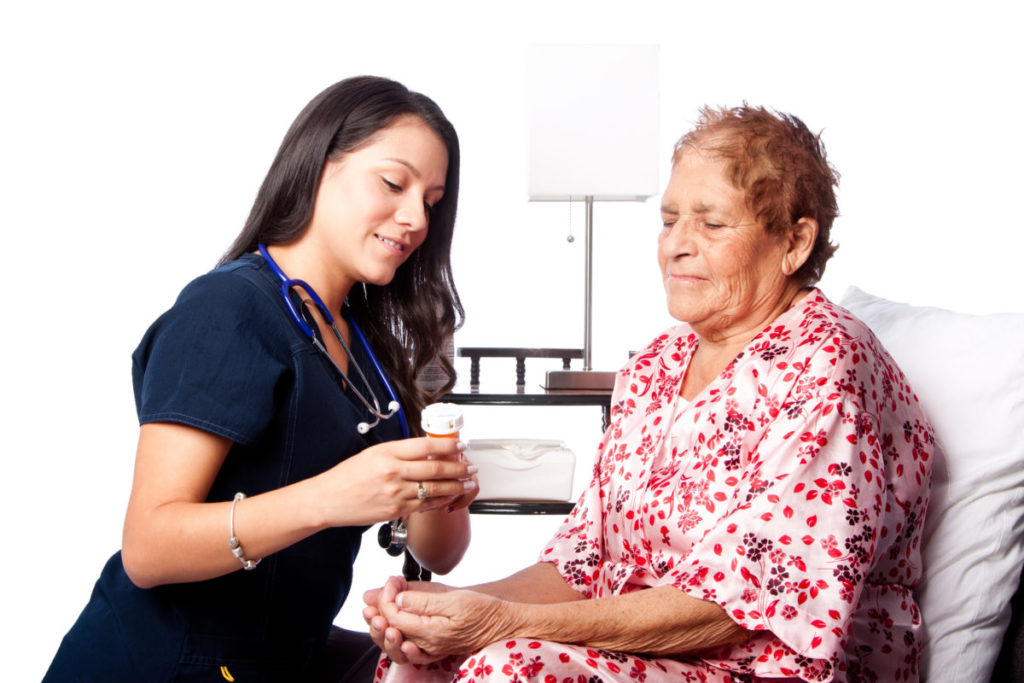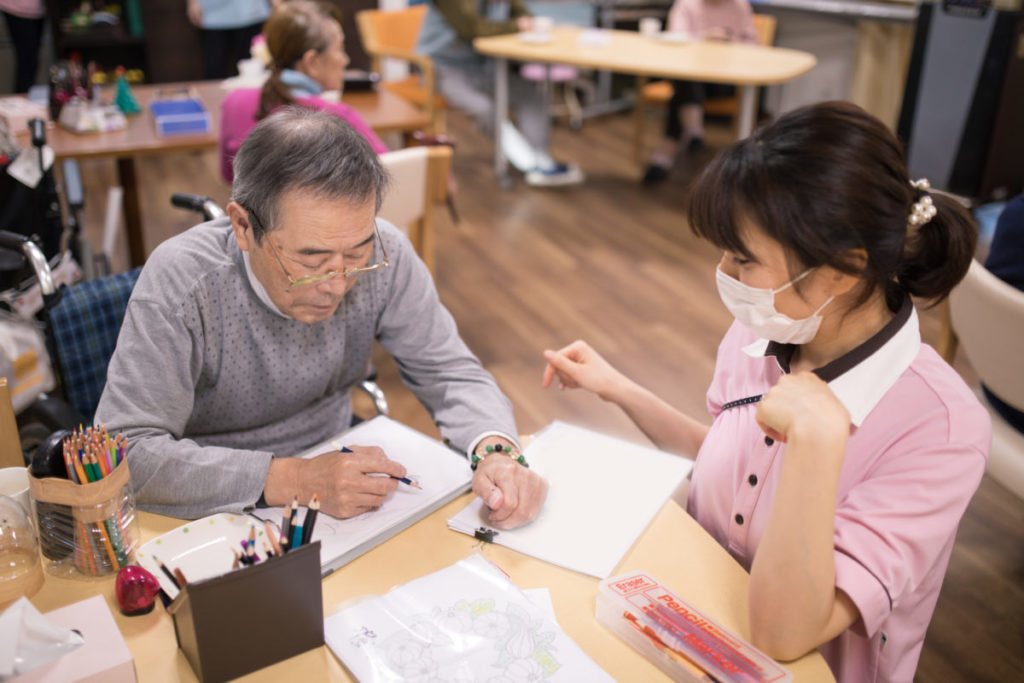Who are In-Home Nurses?
An in-home nurse, home care nurse, medical caregiver, or even home health caregiver is the name given to someone who is a registered nurse (RN) or licensed practical nurse (LPN) and those who provide medical assistance to patients in the comfort of their own home, instead of the patient going into nursing home care or long-term care facility.
Depending on the needs of the person and their medical condition, an in-home nurse will come to their client’s home and provide the care they require.
What Services does an In-Home Nurse Provide?
Home care nurses or in-home nurses are qualified to administer medications, injections and provide medical treatment, and care related to health conditions including diabetes, tracheotomy, respiratory, colostomy, dressing injuries, and so on. They mostly work in assisting those who are elderly, chronically ill, disabled, or cognitively impaired by performing the necessary medical therapies in the home of their clients.

Depending on the needs of the person and their medical condition, an in-home nurse will come to their client’s home and provide the care they require. The in-home senior care nurse may provide simple medication administration, monitoring, and check-up care or more complicated medical treatments and therapies, over a specific period of time during recovery or ongoing.
What if the person in question needs more than just medical care? Perhaps your loved one is having difficulty with mobility and has difficulty going to the toilet or bathing by themselves? Is this something that an in-home nurse assists with? This is a logical question and brings us to something referred to as activities of daily living (ADLs or ADL). ADL is a term used in healthcare that describes the types of activities related to daily self-care. Basic ADL activities are:
- Self-feeding
- Functional mobility (moving from one place to another while performing activities such as getting in and out of bed, or a chair)
- Dressing
- Toilet hygiene (includes getting to the toilet, self-cleaning, getting up from the toilet)
- Personal hygiene (includes brushing/styling hair, shaving, grooming activities)
- Bathing or showering
Give Your Loved Ones The Best Care
Caring for parents as they age is never easy. The help from home care services allows you to maintain your relationship while providing the best care possible.
There are other types of daily living activities that are not necessarily fundamental but related to independent functioning. These are called instrumental activities of daily living (IADLs). IADLs most often refer to the following types of activities:
- Cleaning and maintaining the home
- Cooking and preparing meals
- Shopping and buying necessities
- Running errands (moving within the community)
- Managing money and finances
- Communicating on the phone or through other devices
- Taking prescribed medications
By thinking about the things that your loved one is needing help with, take some time to identify whether they are mostly medical or rather ADL, IADL types of needs.
The ADLs and IADLs refer to non-medical types of tasks (with the exception of administering prescribed medications). By thinking about the things that your loved one is needing help with, take some time to identify whether they are mostly medical or rather ADL, IADL types of needs.
At this point, we can more clearly define the types of assistance available depending on the needs of your loved one. Do they need an in-home nurse or home care helper or perhaps both? Here’s an easy breakdown of what types of in-home caregiver personnel is available and what they can help with:
In-Home Nurse
These are registered nurses (RNs) or licensed practical nurses (LPN) that provide skilled medical care, including administering medications and injections, monitoring vital signs, dressing wounds, and performing medical therapies. Basic ADL activities are things they can assist with during their time with the patient.
Home Caregivers
They provide non-medical personal services (ADLs and IADL types of tasks), such as making meals, light cleaning, bathing, grooming, toileting, and transporting clients to appointments. They do not administer medications but can assist in organizing or reminding clients about their medication schedules.
Companion Homemakers
They mainly help with non-medical home care, but usually don’t perform personal duties for the client such as grooming, bathing, and toilet assistance.
An in-home nurse is a right choice if you or your loved one requires intermittent skilled healthcare services.
After reviewing the various types of in-home caregivers, you can see that the main difference is whether assistance is mostly medical care or personal care in nature. An in-home nurse is a qualified and correct choice when your loved one needs medical care (short-term or long-term). Indeed, they may also need personal care assistance (as related to ADLs), but this may or may not require supplementing another home caregiver or companion/homemaker for this kind of help depending on the amount of ADL assistance needed.
Yes – We Need an In-House Nurse. What Now?
If you’ve determined that in-home nursing service is necessary and you’d like to have a skilled in-house nurse provide care, there are a few more things to consider. If this is for a loved one, you will likely need to speak with them about this topic and have their understanding of what this will mean for them. In other words, what are the real benefits of having an in-house nursing service? How exactly will they help? We can list the main benefits of an in-house nurse in more detail so you or your loved one can appreciate what it will bring to your lives.
In-Home Nurses Provide Health Monitoring and Treatment
Keep in mind that an in-home nurse may not be around 24/7 so, if the patient’s condition requires full-time assistance, supplementary caregiving may be required.

As licensed and registered nurses, home care or in-home nurses can administer prescribed medications to their patients, including intravenously. They are not able to prescribe medications but they are able to make changes to the patient’s dosage with the approval of a physician. This is an important consideration for those who have specific medications that are difficult to administer independently.
In-Home Nurses Provide Companionship
Your in-home nurse will get to know you and will be someone you can talk to regularly about how you feel both physically and emotionally. It is their responsibility to look after your well-being while you maintain the independence of living in your home. The comfort of being in your own familiar surroundings and having at-home care by a skilled medical professional is the best of both worlds.
Indeed, it allows a friendly interaction and may feel like a kind caring friendship as opposed to a clinical check-up. This is a truly positive benefit to having an in-home nurse. We can more easily accept the nature of things as they are if we have a secure and homey environment in place to offset the perhaps worrisome and uncomfortable medical procedures that are necessary.
Give Your Loved Ones The Best Care
Caring for parents as they age is never easy. The help from home care services allows you to maintain your relationship while providing the best care possible.
In-Home Nurses Administer Medication

In-home nurses are not able to prescribe medications but they are able to make changes to the patient’s dosage with the approval of a physician.
As licensed and registered nurses, home care or in-home nurses can administer prescribed medications to their patients, including intravenously. They are not able to prescribe medications but they are able to make changes to the patient’s dosage with the approval of a physician. This is an important consideration for those who have specific medications that are difficult to administer independently.
In-Home Nurses Can Provide Basic ADL Assistance
As mentioned earlier, basic ADL tasks such as toilet hygiene (getting to the toilet, self-cleaning, getting up from the toilet), eating, functional mobility (moving from one place to another such as getting in and out of bed or a chair), dressing, grooming, and bathing are things an in-home nurse can assist with. These are fundamental living activities and in-home nurses are trained to be capable of performing such duties for their patients.
Keep in mind that an in-home nurse may not be around 24/7 so, if the patient’s condition requires full-time assistance with ADL tasks, supplementary caregiving may be required if staying at home is the preference. Although this is not the standard, it is also possible that some home care agencies have home care nurses that can provide additional assistance with simple housekeeping, meal preparation, and laundry, as well.
In-Home Nurses Are Licensed and Skilled

Home care nurses get their licenses and certifications through one of three accredited programs: a diploma program, an associate’s degree, or a bachelor’s degree.
When opting for having an in-home nurse, keep in mind that they are educated, certified, and licensed professionals. Indeed, home care nurses get their licenses and certifications through one of three accredited programs: a diploma program, an associate’s degree, or a bachelor’s degree. Once they’ve earned their diplomas or degrees, they get their license after passing the state nursing board exam. The last step is getting a Home Health Care Nurse certification through the American Nurses Credentialing Center. Once they’ve completed all these, they are qualified to work as in-home nurses.
Give Your Loved Ones The Best Care
Caring for parents as they age is never easy. The help from home care services allows you to maintain your relationship while providing the best care possible.
Where to Find an In-Home Nurse
As mentioned above, in-home nurses are licensed, medical caregivers. Many works through agencies, commonly referred to as ‘home health agencies. It is important to confirm that these agencies are Medicare-certified and that they have met the federal requirements for patient management and care. When considering and contacting an agency it’s important to check and confirm exactly what types of services their in-home nurses can provide. State laws dictate what types of services they can provide to the patient.
There are often services that can assist with finding qualified home care professionals, including home care nurses in your area. Your physician or health clinic, hospital discharge planner, or social worker may offer helpful information or referrals to licensed in-home care nurses as well. The most important things to keep in mind are that they are qualified, licensed, and personally well-suited to you or your loved one. After all, this is an important working relationship and you will want both skilled, quality medical care, but also a person you can communicate with.
In-Home Nurse Expenses
Expenses associated with having an in-home nurse can be offset depending on the type of medical coverage you have. Medicare and Medicaid have precise criteria that must be met for eligibility, and private insurance companies also have their own coverage guidelines. The home healthcare provider can confirm whether they are Medicare-certified (approved to provide services to patients with Medicare). If you have Medicaid they will also be able to tell you what conditions are required for eligibility. Your personal insurance provider will need to confirm its coverage guidelines before you speak with potential home health care agencies.
Overall Summary
An in-home nurse is the right choice if you or your loved one requires intermittent skilled healthcare services (short-term or long-term), such as medication administration, wound care, medical therapies preferably in a home environment. In addition to skilled professional medical care, in-home health care nurses provide medical monitoring of and observation of the patient’s condition, companionship, basic life activity support.

The costs associated with having an in-home nurse can be offset by the type of medical coverage you have and whether the medical homecare provider is certified. When looking for the right in-home nurse and contacting home healthcare agencies, it’s important to ask a number of questions:
- What is the full range of skilled medical services they can provide?
- Do they have licensed and certified health care nursing staff available for the types of services you require?
- What is the availability of its staff (weekends, hours of service, emergency services)?
- Are they Medicare-certified or how do they work with other health care coverage options?
Being a great caregiver is all about making sure the person you’re taking care of gets the right type of care, even if that means finding and employing someone else to assist and perform caregiving duties.
Do you want to cite this page? Use our ready-made cite template.
